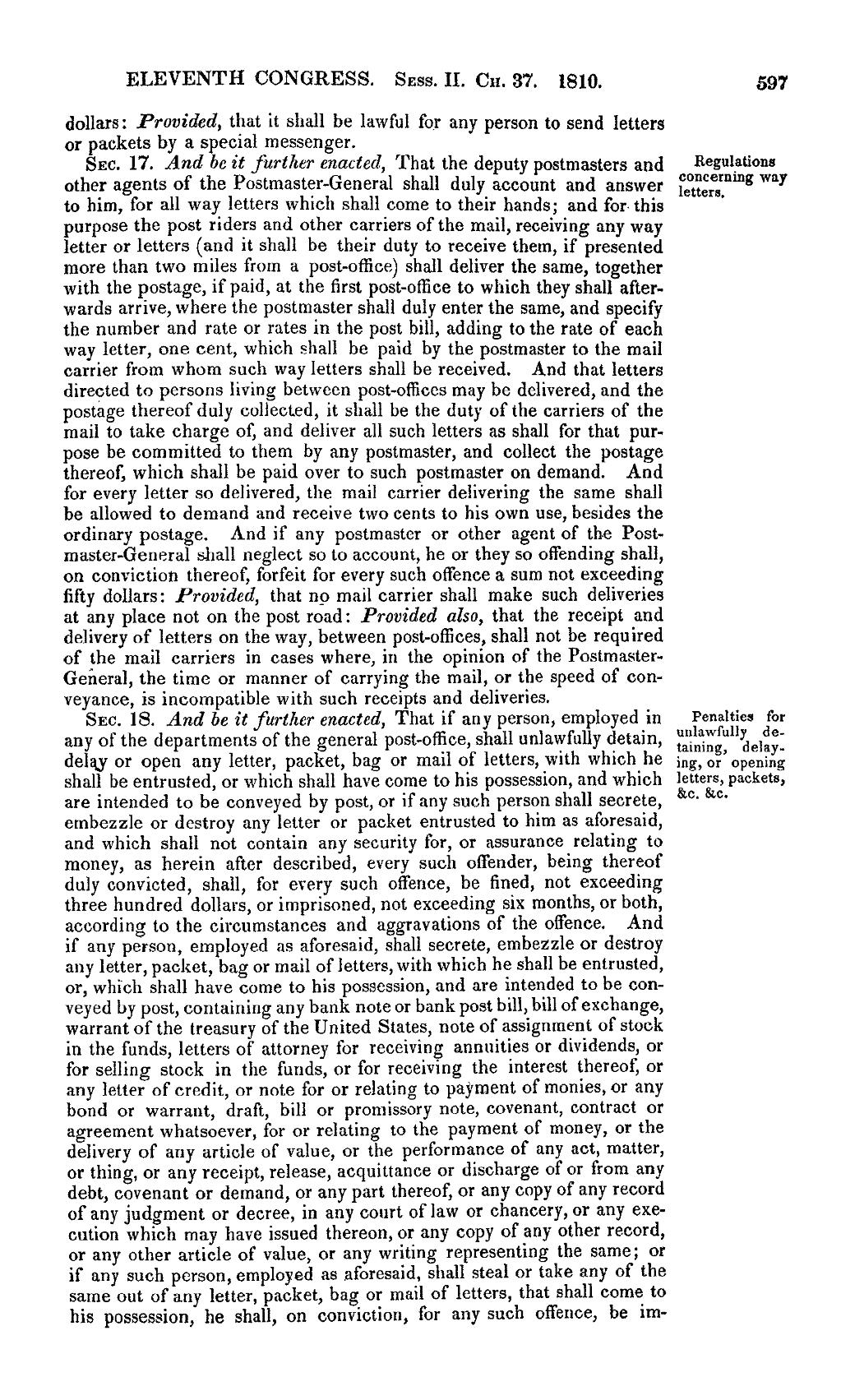dollars: Provided, that it shall be lawful for any person to send letters or packets by a special messenger.
Regulations concerning way letters.Sec. 17. And be it further enacted, That the deputy postmasters and other agents of the Postmaster-General shall duly account and answer to him, for all way letters which shall come to their hands; and for this purpose the post riders and other carriers of the mail, receiving any way letter or letters (and it shall be their duty to receive them, if presented more than two miles from a post-office) shall deliver the same, together with the postage, if paid, at the first post-office to which they shall afterwards arrive, where the postmaster shall duly enter the same, and specify the number and rate or rates in the post bill, adding to the rate of each way letter, one cent, which shall be paid by the postmaster to the mail carrier from whom such way letters shall be received. And that letters directed to persons living between post-offices may be delivered, and the postage thereof duly collected, it shall be the duty of the carriers of the mail to take charge of, and deliver all such letters as shall for that purpose be committed to them by any postmaster, and collect the postage thereof, which shall be paid over to such postmaster on demand. And for every letter so delivered, the mail carrier delivering the same shall be allowed to demand and receive two cents to his own use, besides the ordinary postage. And if any postmaster or other agent of the Postmaster-General shall neglect so to account, he or they so offending shall, on conviction thereof, forfeit for every such offence a sum not exceeding fifty dollars: Provided, that no mail carrier shall make such deliveries at any place not on the post road: Provided also, that the receipt and delivery of letters on the way, between post-offices, shall not be required of the mail carriers in cases where, in the opinion of the Postmaster-General, the time or manner of carrying the mail, or the speed of conveyance, is incompatible with such receipts and deliveries.
Penalties for unlawfully detaining, delaying, or opening letters, packets, &c. &c.Sec. 18. And be it further enacted, That if any person, employed in any of the departments of the general post-office, shall unlawfully detain, delay or open any letter, packet, bag or mail of letters, with which he shall be entrusted, or which shall have come to his possession, and which are intended to be conveyed by post, or if any such person shall secrete, embezzle or destroy any letter or packet entrusted to him as aforesaid, and which shall not contain any security for, or assurance relating to money, as herein after described, every such offender, being thereof duly convicted, shall, for every such offence, be fined, not exceeding three hundred dollars, or imprisoned, not exceeding six months, or both, according to the circumstances and aggravations of the offence. And if any person, employed as aforesaid, shall secrete, embezzle or destroy any letter, packet, bag or mail of letters, with which he shall be entrusted, or, which shall have come to his possession, and are intended to be conveyed by post, containing any bank note or bank post bill, bill of exchange, warrant of the treasury of the United States, note of assignment of stock in the funds, letters of attorney for receiving annuities or dividends, or for selling stock in the funds, or for receiving the interest thereof, or any letter of credit, or note for or relating to payment of monies, or any bond or warrant, draft, bill or promissory note, covenant, contract or agreement whatsoever, for or relating to the payment of money, or the delivery of any article of value, or the performance of any act, matter, or thing, or any receipt, release, acquittance or discharge of or from any debt, covenant or demand, or any part thereof, or any copy of any record of any judgment or decree, in any court of law or chancery, or any or any execution which may have issued thereon, or any copy of any other record, or any other article of value, or any writing representing the same; or if any such person, employed as aforesaid, shall steal or take any of the same out of any letter, packet, bag or mail of letters, that shall come to his possession, he shall, on conviction, for any such offence, be im-
